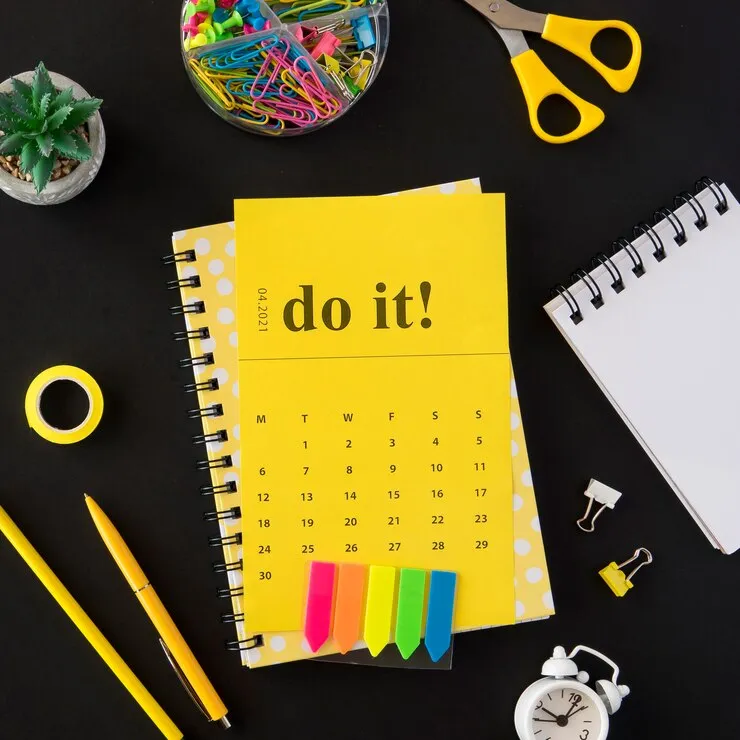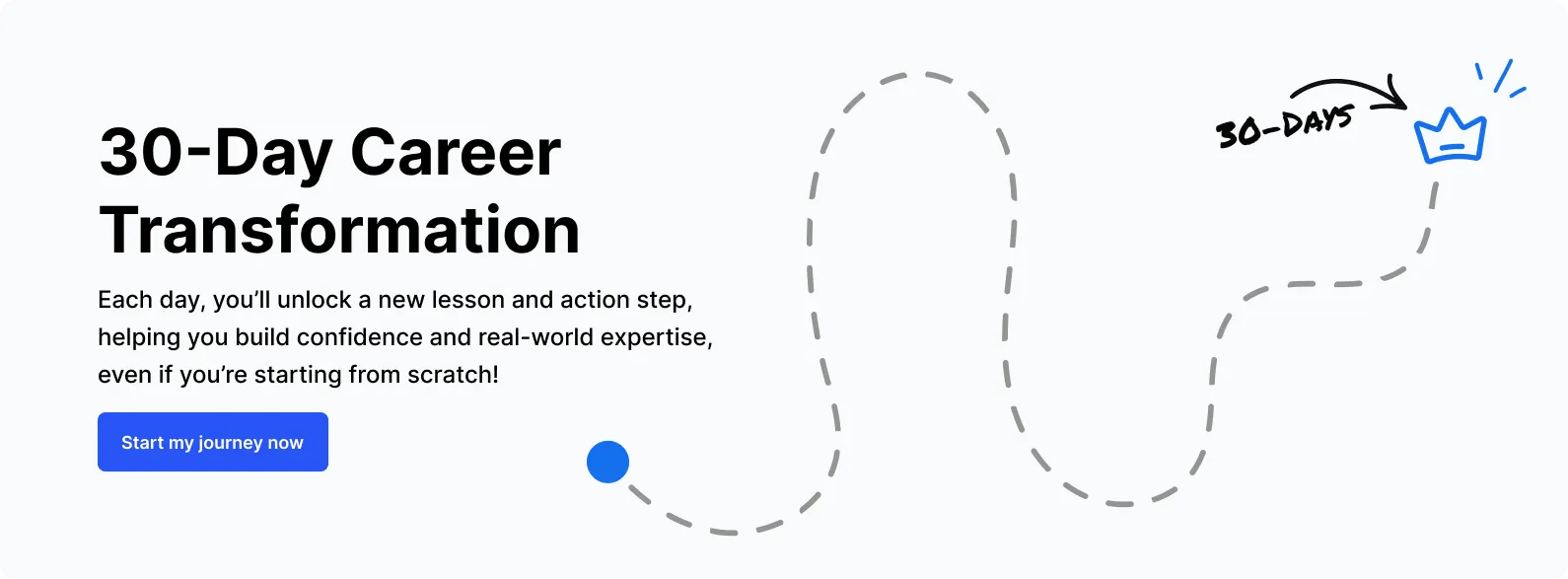6 Daily Habits to Boost Confidence During Career Transition
Transitioning careers can feel daunting, but small daily habits can boost your confidence. Discover six practical habits that make career shifts smoother and more empowering.
Table of contents

Transitioning careers can feel daunting, but small daily habits can boost your confidence. Discover six practical habits that make career shifts smoother and more empowering.
Transitioning careers can feel like stepping into unknown territory, especially when you've spent years mastering a different path. You might doubt whether you have what it takes to start fresh, especially with the rapid changes brought by digital and AI technologies.
But here's the good news: confidence isn't something you either have or don’t—it’s something you build, one small habit at a time.
The key to a smoother career shift lies in adopting daily habits that help you stay motivated, focused, and ready for the journey ahead. By embracing these habits, you’ll start noticing a gradual shift in how you view challenges, tackle uncertainties, and present yourself to potential employers.
In this article, we'll explore practical habits that can greatly improve your approach to your career transition.

Establishing habits that reinforce your belief in yourself can make all the difference when navigating a career transition. Incorporating these six habits into your routine will gradually strengthen your mindset, making the transition feel less daunting and more like an exciting journey toward a better future.
When shifting careers, it’s easy to feel overwhelmed by everything you need to accomplish. Use prioritization tools like the Eisenhower Matrix, which helps you categorize tasks into urgent/important, not urgent/important, urgent/not important, and not urgent/not important.
As Dr. Patricia Suggs, a Leadership Development expert, emphasizes,
“A majority of the stress occurs when you are unclear and uncertain of the direction you would like to take.”
So, begin by clarifying your goals, identifying your passions, and aligning your daily tasks. This clarity will help you approach your career transition with renewed purpose.
Additionally, to enhance stress management during your career change, try the Impact-Effort Matrix Technique, as suggested by Alessandro Pancia, a Leadership Trainer & Executive Coach. He advises,
"Focus first on high impact/low effort tasks to make significant progress quickly, as this will create momentum and build your confidence in your career journey."
This technique encourages you to prioritize tasks based on their potential impact versus the effort needed, dividing them into four categories: high impact/low effort, high impact/high effort, low impact/low effort, and low impact/high effort.
This approach reduces stress, ensuring you invest your energy in tasks that truly matter for your career transition.
Key Actionable Takeaways:

Decluttering might seem like a small step, but it can powerfully boost your confidence during a career transition as Dr. Mia M. shares.
“Life changes, like a career shift, can feel overwhelming, and our environment often reflects that chaos.”
Start with small steps to create a more organized and clutter-free space. Use digital or paper planners to track your progress and break down your tasks into manageable chunks.
A tidy environment enhances productivity and reduces stress, helping you think more clearly about your next steps. As Dr. Mia M. wisely states,
"A clutter-free environment can be a key factor in successfully managing a life transition, helping you gain the mental clarity and emotional space you need to embrace change."
By simplifying your surroundings, you’ll find it easier to let go of what’s holding you back and gain the mental clarity needed to tackle your career transition confidently.
Key Actionable Takeaways:

Staying calm and stress-free is essential when navigating a career transition, especially when the uncertainty feels overwhelming. Mindfulness can be your anchor, helping you regain control and boost your confidence during this period.
As Joyita Dutta Goswamy, Founder of Healing Miracles, advises,
“Mindfulness can help you navigate transition with confidence. Instead of fearing the unknown, use mindfulness to embrace it.”
By taking a few moments each day for deep breathing and focusing on the present moment, you allow yourself to pause, reflect, and center your thoughts.
Mindfulness helps you accept that uncertainty is a natural part of growth, allowing you to feel more in control and less anxious about what lies ahead. It’s about recognizing that challenges are disguised opportunities, shaping you for the journey.
Staying present builds resilience and adaptability, which are crucial in any career shift. Mindfulness reduces anxiety about the future and encourages you to see every step as a chance for personal and professional development.
In embracing this calm mindset, you’ll find the strength to thrive confidently in your new career journey.
Key Actionable Takeaways:

Engaging with social media communities is an opportunity to connect with others going through similar journeys, offering you a sense of belonging and support.
As Cristian Morales points out,
"It is always important to listen to good ideas from others; we will probably find inspiration, stories that resemble our own, or simply practical advice."
Engaging in meaningful conversations can help you discover insights that resonate with your experience and make you feel less alone in your journey.
Start by actively participating in these communities—listen attentively, ask insightful questions, and share your relevant experiences. Remember, it’s not just about taking; your contributions can inspire others.
Amy Sayce emphasizes that,
“Social media is the perfect space to challenge yourself, push boundaries, and step out of your comfort zone to grow confidently."
Engage by liking, commenting, and interacting, gradually building your presence. This will help you gain valuable knowledge and strengthen your confidence as you realize your thoughts and experiences are valued.
Stay authentic, empathetic, and supportive in your interactions. You create a positive environment that encourages growth by genuinely connecting with others.
Key Actionable Takeaways:

The ability to express yourself clearly and assertively can significantly influence how others perceive you and, more importantly, how you perceive yourself.
As highlighted by the School of Meaningful Experiences,
"Confidence at work is a game-changer. It not only influences how others perceive you but also affects how you perceive yourself."
This is why working on your communication skills is essential for boosting self-confidence.
Start by focusing on speaking clearly with declarative sentences. Practice using a confident tone and maintaining eye contact during conversations. This will not only help you convey your ideas effectively but also make you appear more self-assured.
Next, improve your written communication skills by crafting emails, messages, or presentations precisely and clearly. This habit ensures your thoughts are understood and respected, reinforcing your professional presence.
Finally, pay attention to how you use language, tone, and inflection.
Remember, confidence isn’t just about what you say but how you say it. By mastering these communication habits, you’re not only building your confidence but also setting the stage for your career success.
Key Actionable Takeaways:

Reflecting on your progress at the end of each day can be a powerful way to boost your confidence during a career transition.
As Emily Taylor shares from her experience, when she first became a parent to twins, she felt overwhelmed and unsure of herself, going from a capable individual to someone who felt clueless.
However, her turning point came when a health visitor asked her a simple yet profound question:
“What have you learnt this week?” Emily realized, "Being prompted to consider what I was learning helped me to recognise my progress and build confidence."
Applying this concept to your career journey, taking time each day to reflect on your learning path can help you identify what's working, what challenges you faced, and what you can do differently.
Studies from Harvard Business School have shown that individuals who engage in reflection after completing tasks at the end of the day improve their performance by 22.8% more than those who don't.
So, set aside a few minutes every day to ask yourself: What went well today? What could I improve? What did I learn?
This simple habit can help you build confidence, adapt your learning path, and ultimately make your career transition smoother and more effective.
Key Actionable Takeaways:

Building confidence during a career transition isn’t an overnight journey, but by embracing these daily habits, you create a solid foundation for long-term success.
No matter how small, each step you take helps you grow stronger, more adaptable, and ready to seize new opportunities.
If you're looking to develop these confidence-boosting habits further and gain practical skills for a successful career shift, NoCode Institute is here to guide you. Our programs not only equip you with valuable no-code skills but also help you cultivate the mindset needed for a confident transition into the digital economy.
Start building your confidence today with NoCode Institute and take control of your career journey.

Looking to re-invent yourself and turn your talent into a career? Stay up to date with the latest.